- View All
- Topics
- Search
Topics
- 25th Anniversary
- Alumni
- Book Recommendations
- Child Tax Credit
- Coding
- College Admissions
- College Counseling
- Community
- Cultural Learning
- Curriculum
- Distance Learning
- Earth Day
- Engineering
- Fundraising
- Giving
- graduates
- High School
- International Women's Day
- Mandarin Bilingual Preschool
- Mandarin Language Programs
- Mindful Parenting
- Mindfulness
- National Women's History Month
- Parenting
- Parenting Support
- Poetry
- Potty Training
- Preparing for College
- Preparing for Preschool
- Reading
- STEAM
- STEM
- Student Awards
- Student Spotlight
- Teacher
- Teacher Awards
Blog Archive
- 2025 (2)
-
2024 (6)
- December (1)
- May (1)
-
March (3)
- Stratford Preparatory Blackford Middle and High School Students Recognized at Multiple Competitions and Events in March
- Stratford Fremont and Pleasanton Middle School Students Bring Home 46 Science Fair Awards at the Alameda Science and Engineering Fair!
- Stratford Mandarin Language Students Win Multiple National Chinese Culture Competitions!
- January (1)
-
2023 (5)
- September (1)
- June (1)
- April (1)
- February (2)
-
2022 (11)
- November (1)
- August (1)
- July (1)
- June (1)
- May (1)
- March (2)
- February (3)
- January (1)
-
2021 (22)
- December (2)
- November (1)
- October (2)
- September (1)
- August (2)
- July (2)
- June (3)
- May (1)
- April (3)
-
March (4)
- What Families Need to Know About Child Care Benefits in the “American Rescue Plan Act”
- Inside Out: Fostering Emotional Intelligence (EI) in your Child
- Celebrating Women’s Contributions to History One Book at a Time
- Stratford School Congratulates Our 2021 Future City Engineering Competition Participants and Winners!
- February (1)
-
2020 (9)
- December (1)
- September (1)
- August (1)
- May (1)
- April (3)
- March (2)


Potty Training: Which Method Is Right for Your Family?
10 Potty Training Books to Help Parents Find the Right Method and Get Started!
There are many schools of thought on when and how to “Potty Train” or “Toilet Learn” a child. However, the real question to ask is how do you know which Potty Training method or philosophy will work best for your child and your family?
All children and families are different, and teaching your child to use the toilet is not a one-size-fits-all operation. The method you used with your first child may not be the same method that works for your second, third, or even fourth child. Therefore whichever method you gravitate toward, it is important to assess your specific environment along with the individual needs of your child and family before beginning the process.
Key questions to ask yourself before you start:
Taking these factors into consideration can help you decide if your child is ready to get started with Potty Training and which method might best suit your child’s needs. Let’s discuss some of the different methods that are prevalent and some of the most popular books that go along with them.
Parent-led potty training
After assessing a child’s readiness and interest, a parent leads the training process by setting up a plan and organizing a time to eliminate diapers and start the use of the potty chair or toilet. The parent or caregiver works on raising their child’s body awareness while teaching them how to sit and use the toilet through frequent practice, modeling, and encouragement.
Oh Crap! Potty Training: Everything Modern Parents Need to Know to Do It Once by Jamie Glowacki
Potty Training in 3 Days: The Step-by-Step Plan for a Clean Break from Dirty Diapers by Brandi Brucks and Dr. Fredric Daum
The First-Time Parent’s Guide to Potty Training: How to Ditch Diapers Fast (and for Good!) by Jazmine McCoy,PhD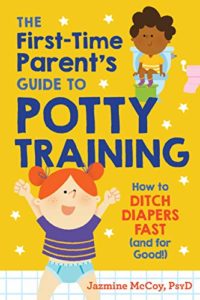
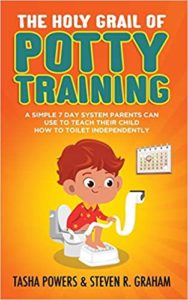
The Holy Grail of Potty Training: A Simple 7 Day System Parents Can Use to TeachTheir Child How to Toilet Independently by Tasha Powers and Steven R. Graham
Child-led toilet learning
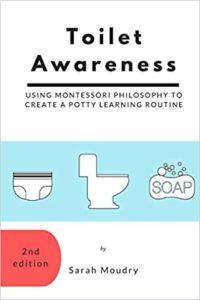 process when they are interested and ready to use the toilet. Parents set up an environment to support awareness and encourage independence.
process when they are interested and ready to use the toilet. Parents set up an environment to support awareness and encourage independence.
This philosophy believes that toilet learning is organic and children will begin on their own when they are ready. Two of the most popular child-led approaches are the Montessori approach and the Elimination Communication method.
The Montessori approach is that toilet learning should be gradual and that children will start the
Toilet Awareness: Using Montessori Philosophy to create a Potty Learning Routine by Sarah Moudry
Elimination Communication is essentially a diaper-free form of potty training. It is started when children are infants and is infant-led with parents learning and acting upon cues from their young child. Usually, to practice this method successfully, a parent is at home with their child full-time and there are no additional caretakers.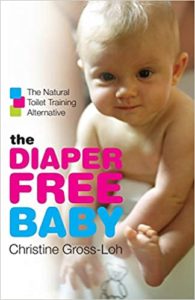
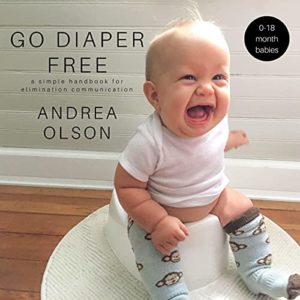
The Diaper-Free Baby: The Natural Toilet Training Alternative by Christine Gross-Loh
Go Diaper Free: A simple handbook for elimination communication by Andrea Olson
Special Needs Potty Training Books: There are some wonderful books that creatively and intentionally address the unique needs of children who may require more individual attention, time, and care. Additionally, there are great resources and specialists who can help you meet the needs of your child during this time. Check with your pediatrician if you feel that you need further assistance.
Ready, Set, Potty!: Toilet Training for Children with Autism and Other Developmental Disorders by Brenda Batts
Finally, if you are not sure where to start, visit your local library or check out some audio versions of the books that initially appeal to you. Whatever method you choose to go with, it is important to map out how you intend to navigate the process. Going into this venture well prepared, confident, and with a clear direction will help your child feel more secure in the process and help you both to have a more successful and positive experience.
Are you ready to explore Preschool? Visit our website at www.stratfordschools.com/preschool to learn more about Stratford School’s innovative hands-on STEAM curriculum that balances academics with fun. Click here to schedule a tour of a Stratford campus near you.